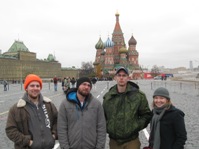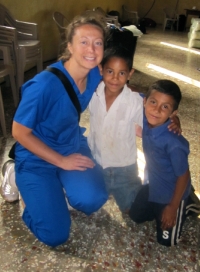Global travels expose UMKC students to a variety of cultures

Kira Mayo (right), a senior Theatre major, stands with other visiting students at the Red Square in Moscow.
A young woman with family roots in Serbia… A man whose friends in west Texas rarely left the state… They are among the host of UMKC students who have faced down their natural shyness, language struggles and fund shortages to live and study abroad.
At UMKC, how that comes about is a process, and the first stop is at the Center for International Academic Programs (IAP). The core of the Center’s work is hosting more than 20 exchange students each year from partner institutions and sending about 300 students abroad on faculty-led and partner school programs. In addition, IAP helps student candidates apply for merit-based, nationally-competitive fellowships to fund research and studies in the U.S. and abroad.
Choosing a university
IAP maintains partnerships with many schools abroad, but if a student opts for a country or school not on the list, IAP will work to make that happen. Typically, UMKC and state scholarships can be applied abroad, if the exchange countries — most of them in Western Europe — have direct partnerships with UMKC.
“I’ve wanted to go to Russia since I was 10 years old,” said Kira Mayo, senior Theatre major. “If I could go to only one place, where would I most regret not seeing? Russia was the obvious answer.
UMKC had no arrangements with Russian schools, but with IAP assistance, Mayo found herself on her way to St. Petersburg, Russia. Her Missouri grants and awards transferred with her, and IAP ensured Mayo’s safety.
Mayo had begun teaching herself Russian a year before she left, but admitted, “I didn’t get far.”
Once she met the faculty at her school, Mayo realized she needn’t have worried. One of her language teachers made it a point to study all the native languages of her students.
“My respect for communication skills has skyrocketed,” Mayo said.
Getting ready: language, language and more language
UMKC staff and faculty are great sources of preparation and encouragement to take the plunge. For example, faculty in the College of Arts and Sciences’ Department of Foreign Languages and Literatures help students gain language competency and schedule appropriate-level classes that would transfer back to UMKC.
Other UMKC courses have been beneficial, such as a Conservatory of Music and Dance course on Mexican music, and a College of Arts and Sciences’ course on Mexican poetry. Professor Felicia Londre’s theatre history classes also provide excellent background.
Because they typically learn English early in their formal education, European students also often are able to help American students understand and adapt.
Doing good
Even while out of the country, UMKC students got involved in community assistance and aid work.
“I volunteered at a local childrens’ center and learned about the struggles of homeless Mexican children,” said Salinda Ragsdale, who received a Master of Arts degree in Romance Languages in 2006. “The next semester I helped a group of local friends rebuild the home of an elderly lady. These experiences familiarized me with Mexican issues and culture: politics, law enforcement, football, business and much more.”
Ragsdale went to Veracruz, Mexico as a Rotary Ambassadorial Scholar. This Rotary program covers expenses for a year of graduate studies.
“My host family was wonderful, and I stayed in touch with them,” said Ragsdale, who now works for the U.S. Immigration Office. “When I taught Spanish, I used the videos and photos I had taken of my host family and their friends to teach my students words and customs of Mexico. I also encouraged my students to practice their Spanish by writing letters to members of my host family.”
Back home
It is common for returning students to feel disoriented by the American lifestyle. There are striking differences in global ethics and mores, and students who have been abroad may require a period of adjustment. IAP offers a listening ear and understanding for those who can’t quite regain their equilibrium.
After studying in Klagenfurt, Austria, Will Buskirk — who received a bachelor’s degree in Geology in 2009 — struggled with American re-entry. A geologist, he was saddened by Americans’ seeming disinterest in recycling. Reality shows, especially those featuring people in violent competition, discouraged him. Some friends and family rejected the new Buskirk, leaving him with a heavy heart.
Despite the cultural disconnect, he was philosophical about the ultimate outcome of his time abroad.
“I spent a year in a natural paradise,” Buskirk said. “I studied things I might not have considered, like German philosophy, history, anthropology, Marx, Kant and the Holocaust. I stopped ignoring my misconceptions, and I am proud that I now opt for foreign literature, movies and music. I have a feeling of absolute privilege in going places and doing things few others have done.”

